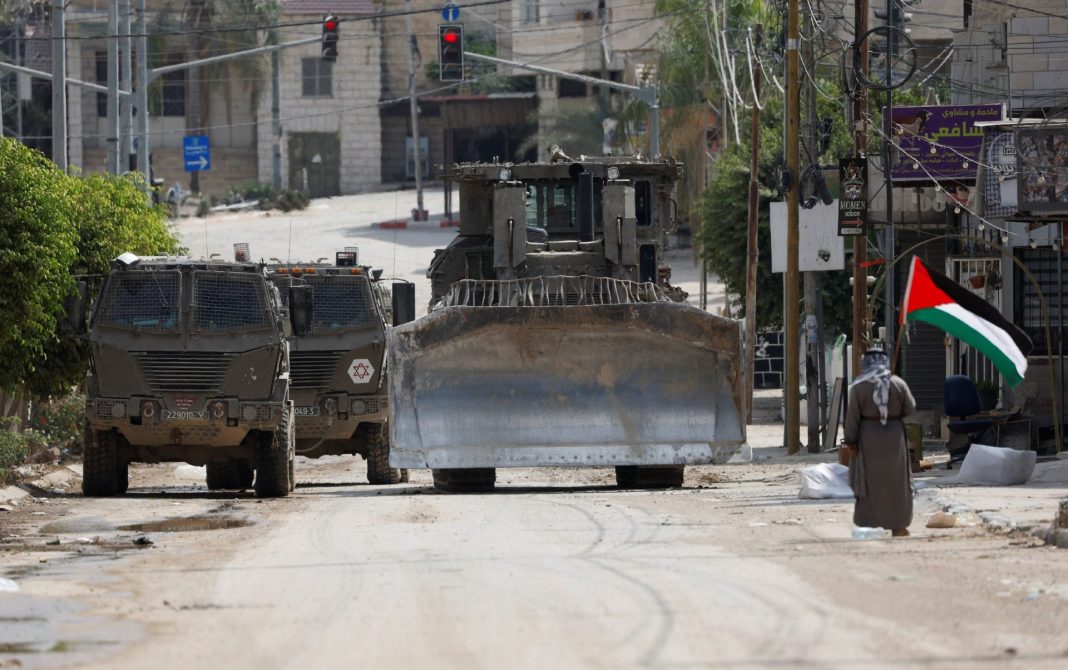The Office for the Coordination of Humanitarian Affairs (OCHA) said in a statement on Wednesday that Israeli attacks have killed more than two dozen people over the past week or so, including children.
The continuing raids, mostly concentrated on the Tulkarem and Jenin refugee camps, constitute Israel’s largest aggression on the occupied territory since the second Intifada in the early 2000s.
The assault has seen significant violence and numerous arrests, while roads and other infrastructure have been destroyed by Israeli military bulldozers.
OCHA said it had mobilised organisations from the UN and beyond to assess the damage and humanitarian needs on the ground.
Visiting Tulkarem on Saturday, the teams confirmed the displacement of 120 people, including more than 40 children, whose homes were destroyed, the statement said.
“At the time of the assessment, 13,000 people in Nur Shams refugee camp experienced water cut-offs, attributed to damages caused to the water network, and sewage overflow was observed. The teams also noted that the population was traumatized and in need of psychosocial support,” OCHA added.
A similar assessment team was denied access to Jenin by the Israeli authorities on Wednesday.
“OCHA warns that access impediments are impacting the ability to provide meaningful humanitarian response. The movement of ambulances and medical teams has been impeded and delayed since the onset of the now-week-long operation. Humanitarian access must always be facilitated,” the statement reads.
Israeli military’s latest assault in Jenin is in its eighth day, and the third day in Tulkarem, where Israeli troops are inflicting “widespread destruction”, according to the Wafa news agency.
Citing its correspondents on the ground, the agency noted Israeli soldiers dropped bombs on the refugee camp, sparking fires in al-Shamaliya neighbourhood.
Israeli snipers were stationed on tall buildings, while spy drones flew and bulldozers damaged infrastructure, with “no street or alley left without destruction”, Wafa reported.
A siege of al-Israa and Thabet schools was also continuing, it added.
Al Jazeera’s team on the ground also reported an ongoing Israeli raid in the Jalazone refugee camp, north of Ramallah. Sources said that dozens of Palestinians have been detained and questioned in local community centres.
At least 20 Palestinians have also been rounded up from Beit Surik. Most returned after they were interrogated.
Other raids were reported in Qalqilya, Nablus with a focus on Balata and Askar refugee camps, as well as al-Khader town south of Bethlehem and al-Azza refugee camp north of the city.
Israeli security forces have besieged Hebron for a fourth day running and more checkpoints and gates have been erected.
Since the onset of the current aggression in the West Bank, the number of Palestinians killed by Israeli troops has increased to 33.
The heightened tensions in the occupied West Bank come as the Israeli regime has since October been conducting a barbaric onslaught on the besieged Gaza Strip, claiming the lives of nearly 41,000 people, most of them women and children.
Governor of Jenin Kamal Abu al-Rub said the Israeli army is preventing water and food from getting to families trapped in certain besieged areas of the northern West Bank city and its refugee camp and families have been forced to leave their homes.
“Around 700 to 1,000 families, 4,000 to 5,000 residents, from the eastern neighbourhood and the Jenin refugee camp were forced to leave their homes at gunpoint [by the Israeli army],” Abu al-Rub stated.
The Jenin municipality has announced that the Israeli army has bulldozed 70 percent of the city’s streets and water has been cut off from 80 percent of homes.
Additionally, 20 kilometres of water and sewage networks, communication and electricity cables have been demolished.
Nidal al-Obaidi, mayor of Jenin, told Middle East Eye that the Israeli operations have left the city looking like the aftermath of an earthquake.
Israeli forces have been stationed there for several days, besieging the area while carrying out bulldozing operations and demolitions.
“No information has been received from the camp due to the tight siege and the cutting off of electricity, water and communications,” Obeidi added.
“The commercial square area, which is considered the heart of Jenin, has been completely destroyed and shopping has completely stopped. Many shops have been demolished, bulldozed and burned amid a severe shortage of food and medicine.”
Israeli forces have “occupied many homes and expelled their owners”, the mayor continued.
Soldiers have also made holes in the walls to facilitate movement between them.
The Jenin Government Hospital had to stop operations in several departments due to water and electricity shortages and a lack of medical supplies, Obeidi said, adding that dialysis patients were transferred to Nablus to continue their treatment.
“What is happening in Jenin portends an environmental and food catastrophe and complete paralysis of life,” he continued.
“The school year is just around the corner, and teachers were supposed to start their work last Sunday, but they were unable to reach their schools.”
Out of the 33 Palestinians who have been killed since Israel launched their largest invasion of the West Bank since the Second Intifada, 19 were in Jenin, the Palestinian health ministry has confirmed.
